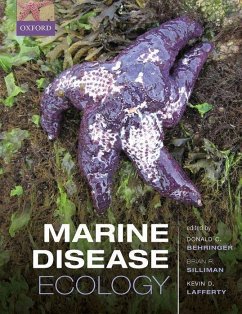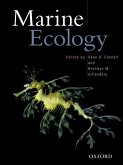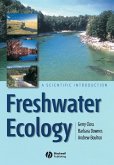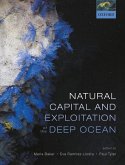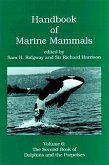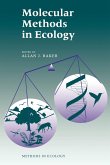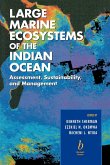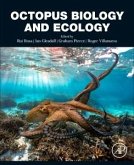Marine Disease Ecology
Herausgeber: Behringer, Donald C; Lafferty, Kevin D; Silliman, Brian R
Marine Disease Ecology
Herausgeber: Behringer, Donald C; Lafferty, Kevin D; Silliman, Brian R
- Broschiertes Buch
- Merkliste
- Auf die Merkliste
- Bewerten Bewerten
- Teilen
- Produkt teilen
- Produkterinnerung
- Produkterinnerung
Global research on marine disease ecology has expanded at an accelerating rate, due to increases in disease emergence across many taxa but also a broader realization that the parasites responsible are themselves important members of marine communities. Courses are now starting to emerge and this first textbook is ideally placed to serve them.
Andere Kunden interessierten sich auch für
![Marine Ecology Marine Ecology]() Sean ConnellMarine Ecology111,99 €
Sean ConnellMarine Ecology111,99 €![Freshwater Ecology Freshwater Ecology]() Gerry ClossFreshwater Ecology125,99 €
Gerry ClossFreshwater Ecology125,99 €![Natural Capital and Exploitation of the Deep Ocean Natural Capital and Exploitation of the Deep Ocean]() Natural Capital and Exploitation of the Deep Ocean66,99 €
Natural Capital and Exploitation of the Deep Ocean66,99 €![Handbook of Marine Mammals Handbook of Marine Mammals]() Handbook of Marine Mammals235,99 €
Handbook of Marine Mammals235,99 €![Molecular Methods in Ecology Molecular Methods in Ecology]() Molecular Methods in Ecology148,99 €
Molecular Methods in Ecology148,99 €![Large Marine Ecosystems of the Indian Ocean Large Marine Ecosystems of the Indian Ocean]() Large Marine Ecosystems of the Indian Ocean189,99 €
Large Marine Ecosystems of the Indian Ocean189,99 €![Octopus Biology and Ecology Octopus Biology and Ecology]() Octopus Biology and Ecology204,99 €
Octopus Biology and Ecology204,99 €-
-
-
Global research on marine disease ecology has expanded at an accelerating rate, due to increases in disease emergence across many taxa but also a broader realization that the parasites responsible are themselves important members of marine communities. Courses are now starting to emerge and this first textbook is ideally placed to serve them.
Produktdetails
- Produktdetails
- Verlag: Oxford University Press, USA
- Seitenzahl: 288
- Erscheinungstermin: 6. März 2020
- Englisch
- Abmessung: 246mm x 189mm x 32mm
- Gewicht: 613g
- ISBN-13: 9780198821649
- ISBN-10: 0198821646
- Artikelnr.: 57877915
- Verlag: Oxford University Press, USA
- Seitenzahl: 288
- Erscheinungstermin: 6. März 2020
- Englisch
- Abmessung: 246mm x 189mm x 32mm
- Gewicht: 613g
- ISBN-13: 9780198821649
- ISBN-10: 0198821646
- Artikelnr.: 57877915
Donald C. Behringer is an associate professor at the University of Florida (USA) where he holds a joint appointment with Fisheries and Aquatic Sciences and the Emerging Pathogens Institute. He received his B.S. in zoology from the University of Florida and his PhD in ecology from Old Dominion University. Research in his lab is focused on the intersection of disease ecology, environmental change, and fishery ecology. Dr. Behringer was a 2015-2016 US-UK Fulbright Scholar to the University of Exeter and a 2018 University of Florida Global Fellow. Brian R. Silliman is the Rachel Carson Professor of Marine Conservation Biology. He holds both B.A. and M.S. degrees from the University of Virginia, and completed his Ph.D. in Ecology and Evolutionary Biology at Brown University. His teaching and research are focused on community ecology, conservation and restoration, global change, plant-animal interactions, and evolution and ecological consequences of cooperative behavior. Kevin D. Lafferty is an ecologist with the U.S. Geological Survey, which serves the United States by providing reliable scientific information to describe and understand the Earth; minimize loss of life and property from natural disasters; manage water, biological, energy, and mineral resources; and enhance and protect our quality of life. He knows little geology, but does some disease ecology and conservation, especially in coastal ecosystems like coral reefs, estuaries, kelp forests, and (preferably) sandy beaches with nice waves. He entered UCSB in 1981 as a freshman, and stayed there until they let him become the surf team faculty advisor.
* SECTION 1: MARINE INFECTIOUS DISEASES AND THEIR ECOLOGICAL ROLES
* 1: Bateman, Feist, Bignell, Bass and Stentiford: Marine pathogen
diversity and disease outcomes
* 2: Mclaughlin, Morton and Lafferty: Parasites in marine food webs
* 3: Morton, Silliman and Lafferty: Disease can shape marine ecosystems
* SECTION 2: DRIVERS OF MARINE DISEASE
* 4: Little, Rojas and Rohwer: Bacteriophage can drive virulence in
marine pathogens
* 5: Burge and Hershberger: Climate change can drive marine diseases
* 6: Bojko, Lipp, Ford and Behringer: Pollution can drive marine
diseases
* 7: Lohan, Ruiz and Torchin: Invasions can drive marine disease
dynamics
* SECTION 3: DISEASE PROBLEMS AND THEIR MANAGEMENT
* 8: Harvell and Lamb: Disease outbreaks can threaten marine
biodiversity
* 9: Raymundo, Burge and Lamb: Disease ecology in marine conservation
and management
* 10: Behringer, Wood, Krkosek and Bushek: Disease in fisheries and
aquaculture
* SECTION 4: WORKING WITH INFECTIOUS DISEASES
* 11: Frasca, Gast, Bogomolni and Szczepanek: Diagnosing marine
diseases
* 12: Ben-Horin, Bidegain, de Leo, Groner, Hofmann, McCallum and
Powell: Modelling marine diseases
* 13: Thurber: Future directions for marine disease research
* 1: Bateman, Feist, Bignell, Bass and Stentiford: Marine pathogen
diversity and disease outcomes
* 2: Mclaughlin, Morton and Lafferty: Parasites in marine food webs
* 3: Morton, Silliman and Lafferty: Disease can shape marine ecosystems
* SECTION 2: DRIVERS OF MARINE DISEASE
* 4: Little, Rojas and Rohwer: Bacteriophage can drive virulence in
marine pathogens
* 5: Burge and Hershberger: Climate change can drive marine diseases
* 6: Bojko, Lipp, Ford and Behringer: Pollution can drive marine
diseases
* 7: Lohan, Ruiz and Torchin: Invasions can drive marine disease
dynamics
* SECTION 3: DISEASE PROBLEMS AND THEIR MANAGEMENT
* 8: Harvell and Lamb: Disease outbreaks can threaten marine
biodiversity
* 9: Raymundo, Burge and Lamb: Disease ecology in marine conservation
and management
* 10: Behringer, Wood, Krkosek and Bushek: Disease in fisheries and
aquaculture
* SECTION 4: WORKING WITH INFECTIOUS DISEASES
* 11: Frasca, Gast, Bogomolni and Szczepanek: Diagnosing marine
diseases
* 12: Ben-Horin, Bidegain, de Leo, Groner, Hofmann, McCallum and
Powell: Modelling marine diseases
* 13: Thurber: Future directions for marine disease research
* SECTION 1: MARINE INFECTIOUS DISEASES AND THEIR ECOLOGICAL ROLES
* 1: Bateman, Feist, Bignell, Bass and Stentiford: Marine pathogen
diversity and disease outcomes
* 2: Mclaughlin, Morton and Lafferty: Parasites in marine food webs
* 3: Morton, Silliman and Lafferty: Disease can shape marine ecosystems
* SECTION 2: DRIVERS OF MARINE DISEASE
* 4: Little, Rojas and Rohwer: Bacteriophage can drive virulence in
marine pathogens
* 5: Burge and Hershberger: Climate change can drive marine diseases
* 6: Bojko, Lipp, Ford and Behringer: Pollution can drive marine
diseases
* 7: Lohan, Ruiz and Torchin: Invasions can drive marine disease
dynamics
* SECTION 3: DISEASE PROBLEMS AND THEIR MANAGEMENT
* 8: Harvell and Lamb: Disease outbreaks can threaten marine
biodiversity
* 9: Raymundo, Burge and Lamb: Disease ecology in marine conservation
and management
* 10: Behringer, Wood, Krkosek and Bushek: Disease in fisheries and
aquaculture
* SECTION 4: WORKING WITH INFECTIOUS DISEASES
* 11: Frasca, Gast, Bogomolni and Szczepanek: Diagnosing marine
diseases
* 12: Ben-Horin, Bidegain, de Leo, Groner, Hofmann, McCallum and
Powell: Modelling marine diseases
* 13: Thurber: Future directions for marine disease research
* 1: Bateman, Feist, Bignell, Bass and Stentiford: Marine pathogen
diversity and disease outcomes
* 2: Mclaughlin, Morton and Lafferty: Parasites in marine food webs
* 3: Morton, Silliman and Lafferty: Disease can shape marine ecosystems
* SECTION 2: DRIVERS OF MARINE DISEASE
* 4: Little, Rojas and Rohwer: Bacteriophage can drive virulence in
marine pathogens
* 5: Burge and Hershberger: Climate change can drive marine diseases
* 6: Bojko, Lipp, Ford and Behringer: Pollution can drive marine
diseases
* 7: Lohan, Ruiz and Torchin: Invasions can drive marine disease
dynamics
* SECTION 3: DISEASE PROBLEMS AND THEIR MANAGEMENT
* 8: Harvell and Lamb: Disease outbreaks can threaten marine
biodiversity
* 9: Raymundo, Burge and Lamb: Disease ecology in marine conservation
and management
* 10: Behringer, Wood, Krkosek and Bushek: Disease in fisheries and
aquaculture
* SECTION 4: WORKING WITH INFECTIOUS DISEASES
* 11: Frasca, Gast, Bogomolni and Szczepanek: Diagnosing marine
diseases
* 12: Ben-Horin, Bidegain, de Leo, Groner, Hofmann, McCallum and
Powell: Modelling marine diseases
* 13: Thurber: Future directions for marine disease research

